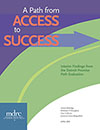The first-year effects are among the largest seen in higher ed evaluation research
A Path from Access to Success
Interim Findings from the Detroit Promise Path Evaluation

 Postsecondary education is widely seen as a necessity in the modern economy, yet among low- and middle-income families, college enrollment rates are dismayingly low — and graduation rates are even lower. College Promise programs, which cover local students’ college tuition and fees, are one strategy states and municipalities use to help. College Promise programs aim to put college in students’ reach financially and to institute a college-going culture for all K-12 students. But traditionally, these programs look only to expand college access, not to address college success.
Postsecondary education is widely seen as a necessity in the modern economy, yet among low- and middle-income families, college enrollment rates are dismayingly low — and graduation rates are even lower. College Promise programs, which cover local students’ college tuition and fees, are one strategy states and municipalities use to help. College Promise programs aim to put college in students’ reach financially and to institute a college-going culture for all K-12 students. But traditionally, these programs look only to expand college access, not to address college success.
Detroit’s Promise program was designed to encourage college attendance among some of the nation’s most underserved students, those in Detroit, Michigan. The next step was to help students succeed once they enrolled in college. To do so, MDRC and the Detroit Promise partnered to create the Detroit Promise Path, an evidence-based student services program. Detroit Promise Path students begin meeting with college coaches in the late summer before their first semester of college. They are given an incentive to attend coaching meetings in the form of a monthly gift card refilled with $50 each month that they meet with coaches as directed. The program lasts all year, including summer semesters, when students are encouraged to enroll in summer classes or engage in a local summer jobs program. The entire operation is supported by a management information system.
This report presents findings from MDRC’s randomized controlled trial evaluation of the Detroit Promise Path. About two-thirds of eligible students were randomly assigned to be offered the new program, while the rest were assigned to a control group who receives the Promise scholarship alone, and thus does not meet with coaches or receive incentives. Comparing the two groups’ outcomes over time provides a reliable estimate of the effects of the Detroit Promise Path. The findings in this report include the following:
- The program has a positive effect on students’ persistence in school, full-time enrollment, and credit accumulation. The effects on persistence and full-time enrollment in the second semester are statistically significant and among the largest MDRC has found in postsecondary experiments. They are especially notable because less than two-thirds of the study sample enrolled during the first semester.
- Although it is too early to reach a conclusion about effects in the second year of the study, the early findings are encouraging. Data on second-year outcomes are only available for the first group of enrollees, who have been followed for two years. Findings in the second year are positive, but not all are statistically significant and the effect on credits earned is smaller.
- Participation rates were high among enrolled students, and students reported positive experiences in the program, especially in their relationships with their coaches. The vast majority of program group students engaged with the program, and the average number of coaching meetings remained high throughout the two program years. In focus groups and a student survey, nearly all students reported valuing the program.
A future report will examine the program’s effect on graduation rates. It is clear, though, that Detroit Promise Path is having a positive effect on students in the first two years. This evaluation shows that building student support services into Promise scholarships can have a meaningful effect on students’ academic progress.







